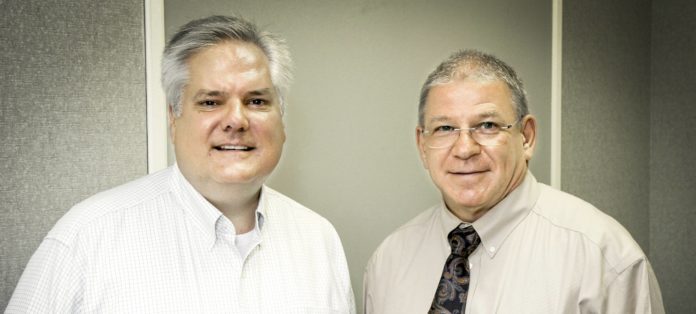
Instruments in hand, a medical resident begins a complex surgery. While the procedure is virtual and doesn’t involve an actual patient, the experience is realistic and hands-on.
This virtual reality training software is being designed by two Mercer University faculty members who want to help future neurosurgeons develop their skills.
There is a tremendous need for technology to train the next doctors, but medical simulators have been somewhat limited in their capabilities so far, said Dr. Andy Pounds, Mercer chemistry and computer science professor. That’s why he and Dr. Richard Rowe, a Navicent Health neurosurgeon and adjunct professor of surgery for the School of Medicine, are creating a program that gives users more realistic responses throughout simulated neurosurgery procedures.
Dr. Rowe has been working with virtual reality technology since the early 1990s, and he even had a virtual reality lab when he was on the faculty at the University of Arkansas in Little Rock. When he moved back to Macon in 2009, all of his virtual reality equipment came with him. Two years ago, he created a rough demo of his vision for a virtual training software, and he recruited Dr. Pounds to help bring it to life.
“(Virtual reality) doesn’t replace traditional teaching, but it augments it,” Dr. Rowe said. “If you can look at it and maybe even hold it in your hand and examine it, I think it makes it much easier to grasp.”
The project received some Research that Reaches Out funding this summer and in 2017. A lot is left to do before the computer program can be rolled out, Dr. Pounds said. It could be years worth of work, but they’ll complete one component at a time until it’s ready, Dr. Rowe said.
“Not only do you have to develop it to where it’s working, but you have to verify that it does work,” Dr. Rowe said. “You have to test it, document and prove that if you’re going to train somebody on a device that it’s an accurate device.”
This summer’s focus was creating the “haptic feedback” component that will allow students to experience how the body feels and changes as it is pressed, Dr. Pounds said. They’ve been using a large brain model to build that plasticity factor into the program.
Eventually, they’d like to be able to have a trained professional take a student through that surgery process. They would be in the same “virtual reality space,” but they could join from different locations.

With this kind of technology, medical professionals who are required to perform a certain number of procedures for credentialing could build up their cases quicker, Dr. Rowe said. Surgeons could have an opportunity to practice surgeries they don’t do often.
This isn’t the only virtual reality project that Dr. Rowe and Dr. Pounds are working on. They are also in the process of creating a virtual roller coaster ride that takes passengers through the stages of embryological development, from a cell to a newborn baby.
The riders sit in a model roller coaster car, put on VR goggles and take a virtual tour inside the body. The educational program will be targeted toward elementary and middle school students, and the goal is to bring it to any school, church or community group that requests it and offer the software at no cost.
So far, four student interns have helped to build on the two virtual reality projects, Dr. Rowe said. Several other students also are interested in getting involved, Dr. Pounds said.
Sophomore Katharine Warner and senior Lauren Fowler worked on the two projects during a 10-week summer internship. Fowler, a computational science major and math and psychology minor, said she was interested in the computer graphics aspect of the internship. Warner, a neuroscience major and computational science minor, is fascinated by the brain and wants to be a neurosurgeon one day.
It’s possible that elements of the two projects could merge in the future as virtual training in neonatal surgery or even neonatal neurosurgery, Dr. Pounds said.










